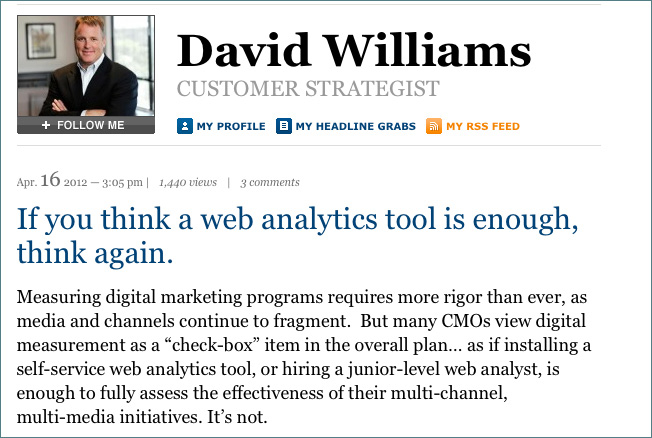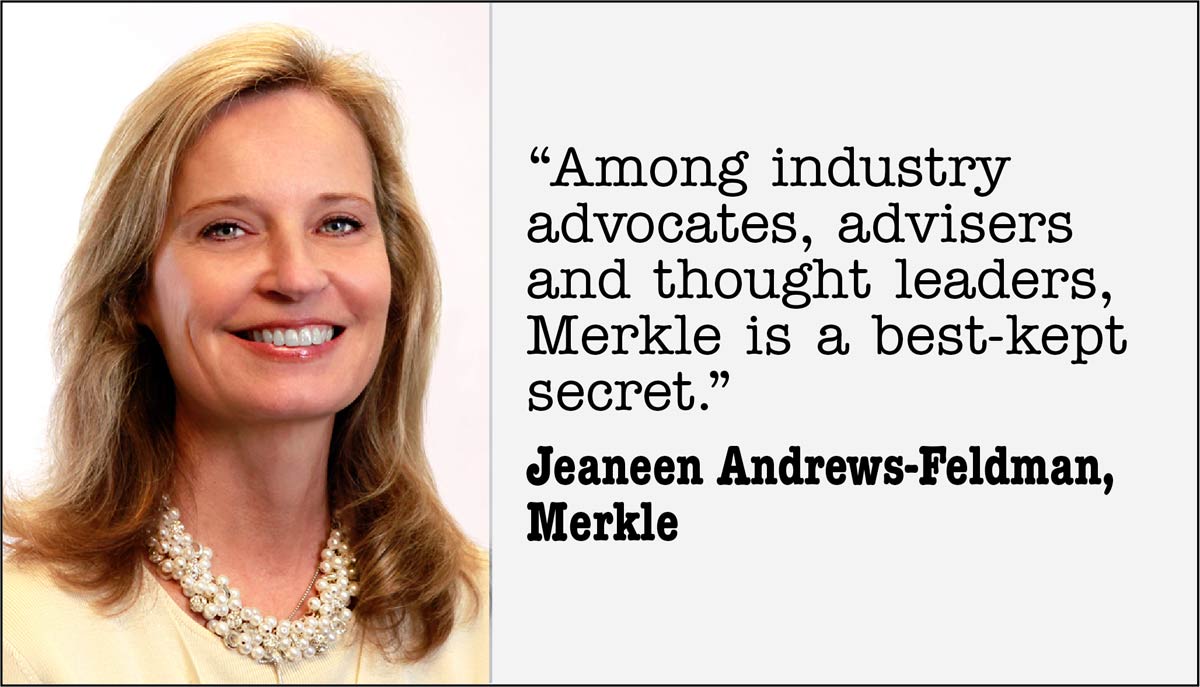 |
| Customer relationship marketing agency Merkle has positioned CEO David Williams as a thought leader in the industry. His monthly blog on the Forbes CMO Network has garnered thousands of views. Image courtesy of Ricochet |
Company: Merkle
Merkle Agency: Ricochet Public Relations
Timeframe: Aug. 2010 - Present
Merkle is a privately held customer relationship marketing (CRM) agency headquartered in Columbia, Md. The 20-plus year-old company, which offers a range of services—including consulting, database marketing, creative and communications services and digital media services—had 2011 revenues of $303 million, with 1,600 employees.
Historically, Merkle has kept pace with competitors via strategic acquisitions, buying software and technology providers, data and analytic companies, and creative and direct mail services firms.
But in late 2010, Merkle and its PR agency of record, Ricochet Public Relations, embarked on an ongoing broad PR campaign to further lift the Merkle brand, and differentiate the agency from its traditional competitors, such as Acxiom and Epsilon —both publicly traded corporations.
With the overall objective of keeping its edge as one of the top independent CRM agencies, Merkle and Ricochet developed a two-tiered campaign strategy with thought leadership and media relations as the pillars:
• Position leaders of verticals at Merkle as experts in their spaces—go-to sources for the press on industry trends.
• Put CEO David Williams in the spotlight as a business innovator and leader of a company that has grown about 20% year after year.
These strategies were built upon that fact that Merkle has made a point of hiring executives from a range of industries who—armed with that industry-specific knowledge—will help grow the company in those areas, says David Michael Baum, account supervisor at Ricochet Public Relations.
 |
CEO Williams’ strengths as a “change agent” in CRM lies in his depth of knowledge and experience, says Jeaneen Andrews-Feldman, VP of marketing at Merkle. “We also place him front and center because of his pervasive passion for building a great company,” she says.
And CRM does need thought leaders. Companies are starved for actionable customer data, yet CRM implementation has historically been difficult, thanks to poor planning, poor integration within the enterprise and siloed thinking. CRM can also be complex, with elements of marketing, communications, customer service and analytics all playing a part.
STOKING THE MEDIA FIRE
The challenge for Merkle, says Andrews-Feldman, is that the company still doesn’t have the brand awareness of some of its competitors within the marketing industry. “Among industry advocates, advisers and thought leaders, Merkle is a best-kept secret,” she says. Merkle’s roots in database marketing, coupled with growing digital services, are now creating awareness of the Merkle brand for the broader marketing community.
Knowing that the industry was hungry for knowledge and Merkle was the company that could deliver it, Ricochet set out to establish thought leaders within Merkle’s verticals, which include: banking and finance; consumer goods; insurance and wealth management; life sciences; nonprofit; specialty retail; and travel, media and entertainment.
Ricochet examined the media landscape within each of those verticals, drilling down to journalists who cover them on a regular basis. “We had to find out what reporters were writing about,” says Baum, “and match our expertise to those topics.” Ricochet uses media alert systems such as Meltwater to keep track of the CRM industry and vertical trends. The key with this research was focusing on good matches. “We won’t pitch 100 reporters,” says Baum. Five to 10 per vertical is more like it.
The process is as follows: If a reporter is focusing on mobile marketing in third-world markets, Ricochet will have a vertical leader ready with insight, and they’ll also offer the journalist other relevant topics they could write about. Mobile is an example of a market ripe for insight, and Merkle has placed that division’s leader, Chris Wayman, front and center as a thought leader.
In addition, Merkle Connect, a full-service social CRM agency, has seen tremendous growth because of the increasing demand for measurement of Facebook, Twitter and other platforms. Merkle Connect’s leader, Rich Fleck, has written numerous articles on the evolutions occurring in social media and how companies are adapting their tactics to reflect this change.
Another tack taken by Ricochet is having Merkle’s clients talk to the media about their own initiatives and successes.
“Our clients are often protective of their success stories, in an effort to maintain a competitive edge,” says Andrews-Feldman. “However, some find that there is great value in positioning themselves as market leaders—and even to help consumers understand their thoughtful approach to placing the customer at the center of their organization.”
In another approach to establishing its thought leadership position, Merkle has landed about 35 industry speaking opportunities for its executives over the past year, many with the help of Ricochet.
Ricochet’s core team of three people and Merkle’s communications team of Andrews-Feldman and Sarah Piccirilli, public relations and analyst relations specialist, touch base regularly to set content and outreach strategies.
“My day-to-day work with Ricochet involves maintaining good relationships with the media to ensure appropriate coverage, which ultimately results in a positive image for Merkle,” says Piccirilli.
CEO POSITIONING
Meanwhile, Ricochet and Merkle worked to position CEO Williams as a true innovator.
“Marketers today are struggling with executing a true customer-centric marketing strategy, and David has been a leader in the marketing evolution around ‘customer strategy as a business strategy,’” says Andrews-Feldman.
To trumpet that expertise, Ricochet and Merkle landed a gig for Williams as a blogger on the Forbes CMO Network. Each month Williams opines on customer-centric topics like analytics, Web site optimization, social media and the aforementioned mobile space.
On Jan. 1, 2012, the Washington Post covered Merkle and Williams in a profile story that touted the local company’s success and Williams’ “hard-charging” philosophy. Other notable CEO hits included interviews with the Washington Business Report and the Baltimore Sun.
Outreach on behalf of both Williams and Merkle’s vertical leaders have paid off in increased visibility for the brand. Results include:
• David Williams’ Forbes blog has garnered 7,862 views since it launched in July 2011.
• Media and contributed article placement for Merkle’s vertical leaders include: Destination CRM; DailyDealMedia.com; Social Media Insider; and Bank Systems & Technology.
• Event speaking opportunities have included the Mobile Strategies Forum; 2012 Washington Nonprofit Conference; ePharma Summit; Mobile Marketing Association Forum; Direct Marketing Association’s DMA2011; Annual CRM Executive Summit; and more.
• Through Andrew-Feldman’s efforts and the partnership with Ricochet, Merkle landed on Ad Age’s Agency A-List issue: “Ten Agencies to Watch in 2012.”
POISED FOR GROWTH
The good news for Merkle is that even in a sluggish economy, it has continued to grow at an impressive rate. “There will be more attention paid to vertical industry solutions, more thought leaders and new topics of discussion,” says Baum.
In fact, in February, Merkle paved the way toward more growth by acquiring Social Amp, a New York-based Facebook developer known as an expert on Facebook Open Graph marketing.
Andrews-Feldman cites a Merkle e-book, 2012 Marketing Imperatives—Blueprint for CMOs as a cornerstone for making even greater inroads within the marketing community. The book explores the essential skills for creating competitive advantage through customer strategy as a business strategy.
“Marketing trends such as the digitization of media and channels, socially enabled mass engagement of consumers and the challenges of our economic climate have illuminated several truths about the state of customer relationship marketing today and what’s required to gain competitive differentiation,” says Andrews-Feldman.
Communicating Merkle’s ability to help with that differentiation is ultimately what it’s all about. PRN
CONTACT:
David Michael Baum, [email protected]; Jeaneen Andrews-Feldman, [email protected]; Sarah Piccirilli, [email protected]; Becky Carroll, [email protected].
Follow Scott Van Camp: @svancamp01
